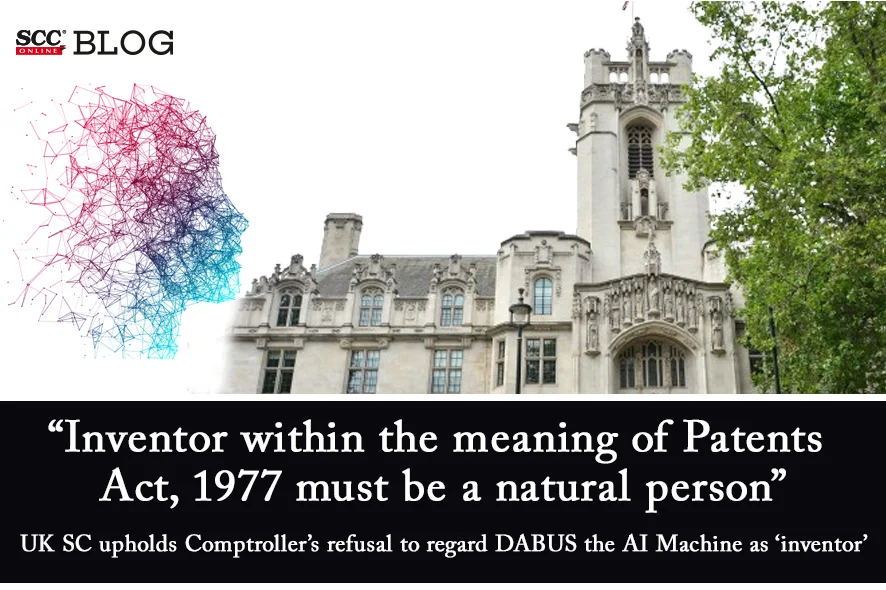Supreme Court of United Kingdom: In a significant decision revolving around Artificial Intelligence (AI) and Patents, the Bench of Lord Hodge (Deputy President), Lord Kitchin*, Lord Hamblen, Lord Leggatt and Lord Richards unanimously stated that Comptroller was right to find that DABUS (the AI machine) is not and never was an “inventor” for the purposes of Section 7 or Section 13 of the Patents Act, 1977.
The Court stated that the structure and content of Sections 7 and 13 of the Patents Act, 1977 on their own and in the context of the Act as a whole, permit only one interpretation, i.e., an inventor within the meaning of the 1977 Act must be a natural person, and DABUS is not a person at all, it is a machine created or generated the technical advances disclosed in the applications on its own.
Background and Legal Trajectory: This case concerns two British patent applications (the “Applications”) submitted by the appellant for two inventions that were created by an AI machine known as DABUS in the absence of a traditional human inventor. The appellant is the sole owner, creator, and user of DABUS. The applications were filed by the appellant under Patents Act 1977 (the 1977 Act). The request for grant forms which accompanied them stated that the appellant was not an inventor.
The appellant was notified that he would need to file a statement of inventorship and an indication of the derivation of his right to the grant of the patents within 16 months of the filing date of the applications in accordance with section 13(2) of the 1977 Act and Rule 10(3) of the Patent Rules 2007 (“the Rules”). In response, the appellant maintained that the inventor was in each case a machine called DABUS, acting autonomously and powered by artificial intelligence (AI), and that he acquired the right to the grant of the patents by his ownership of that machine.
The appellant requested a hearing wherein he argued that the information he had provided met the requirements of the 1977 Act and the Rules. On 4-12-2019, the Hearing Officer for the Comptroller, held that DABUS could not be regarded as an inventor for the purposes of the 1977 Act, and further, that the appellant was not entitled to apply for the patents simply by his ownership of DABUS.
The High Court and the Court of Appeal by a majority, dismissed appeals against Comptroller’s decision; hence the appellant approached the Supreme Court via the instant appeal.
Court’s Assessment: While perusing the facts of the case, the Court clarified that the instant appeal concerned with the correct interpretation and application of the relevant provisions of the 1977 Act to the applications made by the appellant and not with the broader question of whether technical advances generated by machines acting autonomously and powered by AI, should be patentable or not.
The Court further reiterated that, “In this jurisdiction, it is not and has never been Dr Thaler’s (appellant) case that he was the inventor and used DABUS as a highly sophisticated tool. Had he done so, the outcome of these proceedings might well have been different”.
The Court considered the following issues while deciding the appeal-
The scope and meaning of “inventor” in the Patents Act, 1977 and whether it extends to AI powered machine such as DABUS:
Noting that this issue has been decided against the appellant at every stage of the proceedings. The Court was of the view that position taken by the Comptroller is entirely correct.
It was stated that Sections 7 and 13 of the 1977 Act, permit only one interpretation, that an inventor must be a natural person. DABUS is not a person, it is a machine and on the factual assumption underpinning these proceedings, created or generated the technical advances disclosed in the applications on its own.
Therefore, the Comptroller was right to decide that DABUS is not and was not the inventor of any new product or process described in the applications. Further, it is not and never was an “inventor” for the purposes of Section 7 or Section 13 of the 1977 Act.
Was the appellant nevertheless the owner of any invention in any technical advance made by DABUS and entitled to apply for and obtain a patent in respect of it?
The Court pointed out that Section 7 of the 1977 Act confers the right to apply for and obtain a patent and it provides a complete code for that purpose. The provision requires there to be an inventor and an inventor must be a person. DABUS is not a person. Secondly, the applicant, if not the inventor, must be a person falling within one of the limbs of Section 7(2)(b) or alternatively, within Section 7(2)(c). The Court was of the view that the appellant did not satisfy any part of this carefully structured code.
Was the Hearing Officer entitled to hold that the applications would be taken to be withdrawn?
The Court stated that the Comptroller was entitled to hold that the appellant did not satisfy either of the requirements in Section 13(2) of the 1977 Act as he failed to identify any person or persons whom he believed to be the inventor or inventors of the inventions described in the applications; and his ownership of DABUS did not provide a proper basis for accepting his claim to be entitled to the grant of the patents for which he had applied.
The Court thus concluded that the Comptroller was right to find the appellant’s applications would be taken to be withdrawn at the expiry of the sixteen-month period specified by Rule 10(3) of the 2007 Patent Rules.
[Thaler v. Comptroller-General of Patents, Designs and Trade Marks, 2023 UKSC 49, decided on 20-12-2023]
*Judgment by Lord Kitchin







